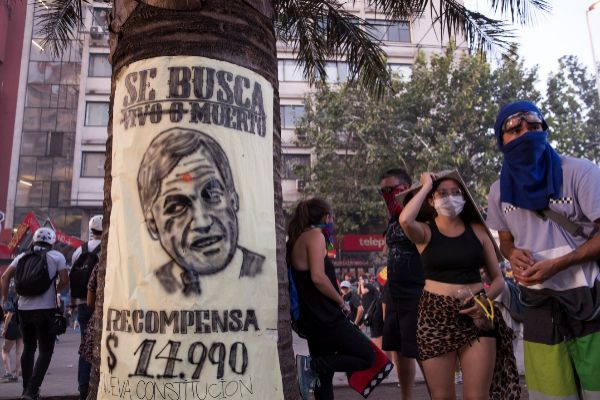- Protests: Sebastian Piñera chokes on the Chilean Constitution
- Direct witness: Fire and destruction organization in Chile against the symbols of power
Street graffiti is usually the best reflection of the spirit that encourages conflicts, revolutions and popular protests . In Hong Kong, the drift towards violence that a sector of local youths adopted was certified when they began decorating the walls with that motto that said "If we burn, you will burn with us."
In Santiago, Chile, the authors of the hundreds, if not thousands, of messages that color the walls of the center of the Chilean capital are a reflection of the encounter - in some citations close to nihilism - that houses a wide sector of local society towards everything representing a state to which many messages simply wish him "death."
Slogans such as "Do not kill animals, kill a paco (the nickname of the agents of the local security forces)", " Paco muerto does not violate" , (Sebastián) Piñera mátate "or the one that said" burn everything ", let you anticipate the enormous challenge facing the historic agreement signed at dawn on Friday in the local parliament between the official sector led by President Sebastián Piñera and most of the opposition parties to hold a referendum in April that could basically tell the future of the country and of the constitution inherited from the dictatorship.
The two-page agreement includes a double consultation in which the population will first be asked if it is in favor or against the reform of the magna letter that was adopted in 1980 under the control of the military regime led by Augusto Pinochet. If the answer is affirmative - as all polls anticipate -, the population can also choose whether the wording of the text is carried out by a constitutional convention composed exclusively of citizens and civil society , or through a mixed convention that groups in equal parts to social representatives and legislators .
Whatever the formula chosen to design the next magna letter, its writing will take between nine and 12 months, and then it will also have to be submitted to the popular endorsement.
"Tonight is historic," said Senate President Jaime Quintana when he appeared in front of the media seconded by all the representatives of the groups that support the compromise, from which only the Communist Party was excluded. The decision involves a significant concession of Piñera to the popular mobilizations that began on October 18, as implicitly acknowledged by her own spokeswoman, Karla Rubilar.
"The citizens woke us up and it is who decides. The citizenship always wins ... they gave us a tremendous lesson," Rubilar said after the agreement was known, which was signed shortly after 2:30 a.m. Despite these claims, Jacqueline van Rysselberghe, president of the ultraconservative Independent Democratic Union, part of the coalition that appealed to Piñera to the presidency, confirmed the deep suspicion with which this sector has welcomed some sectors of the ruling party that will vote "no "to constitutional reform.
For her, the legal document "has allowed the country to grow in the last 30 years" and the fact that her training accepted the arrangement was due only to the spiral of violence in which the country had embarked, which has already cost the life to 22 people , has left thousands injured and has caused a severe economic breakdown.
"It was essential to reach an agreement ... Restoring social peace," he said.
The agreement caused the euphoria of the stock market and the local currency, and headlines such as the one that dominated the cover of the newspaper La Segunda: "the night in which the politicians woke up", read on that page.
"There are many Chileans who have played their lives to make Chile a fairer country and it is thanks to them for what we are here," said Deputy Gabriel Boric, of the left Social Convergence. Piñera added another conciliatory nod to the day by accepting the resignation of the head of the National Intelligence Agency, Luis Masferrer, whom the president himself criticized in a veiled manner in recent days by saying in an interview with the newspaper El Mercurio that the service of local intelligence "is not working well", since he did not know how to anticipate the very serious social outbreak facing the nation.
At the same time that the political pact was finalized in the capital, protests continued mainly in the south of the country, where new episodes of violence were recorded in cities such as Puerto Montt - where a group of exalted assaulted and partially burned the town's cathedral -, or Temuco.
"I don't know if we can trust these politicians. They have been lying for decades," argued Fidel Romel, a 25-year-old boy, who commented with friends about the new political situation in the iconic Plaza Italia in Santiago. A few meters from there, another graffiti summed up with certainty the origin of all these altercations. "It's not 30 pesos, it's 30 years," an anonymous hand had written in reference to the initial increase in the meter that gave rise to the revolt.
According to the criteria of The Trust Project
Know more- Sebastian Piñera
- Chile
Latin AmericaHistorical agreement in Chile for a plebiscite in 2020 that leaves behind the Pinochet Constitution
Riots in ChileSebastián Piñera apologizes to Chileans and announces a "Great National Agreement"
Argentina The Argentine president-elect joins the "free Lula" to sharpen the division in Latin America

